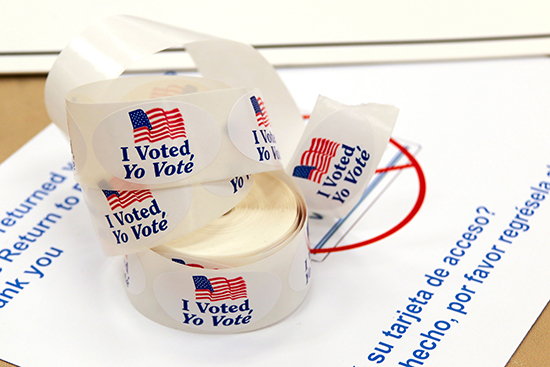Students at Alexandria City High School’s 9th grade campus can’t vote yet, but that doesn’t mean they don’t have opinions on the future of our country. They have concerns over the major candidates’ ages and whether they agree with their stances on current and proposed policies.
President Joe Biden and former President Donald Trump are the major candidates this election season and have been elected by the voters before. However, minors aren’t comfortable with either this go-round but aren’t always specific about their concerns.
“Disappointed, it feels like the younger generation of the country isn’t being represented as much as the older generation,” Petra Evans said inside a journalism classroom within the Minne Howard campus.
What many people find concerning is that Trump has leaned into his loyal following — the same loyal following that tried to keep him in office on January 6, 2021. Trump said that as president he won’t sign a law about abortion rights and that those decisions are up to the states and that he wants immigrants from “nice” countries. Biden is currently unpopular due to his handling of the Israel-Hamas conflict. Biden is also pushing another student loan forgiveness plan.
Gray Pierce had a similar answer to Evans. “Bad, I feel bad about that, I don’t want them to be that old,” he said.
The main two presidential candidates for the November 2024 election are 77 (Trump) and 81 (Biden), respectively. They are both more than a decade over the age of retirement. The age of retirement is 67, according to the Social Security Administration.
Of course, the presidential election has third party candidates, even though they often don’t get very far and often only split the votes of their respective party, such as Theodore Roosevelt when he ran with the Progressive Party — splitting the Republican vote between himself and William Howard Taft. It should also be noted that being in politics is not a prerequisite for being the president and theoretically anyone can be elected to hold the office.
When asked about how informed they were on the major candidates and third party candidates, Evans was the only person interviewed who could say that they were informed on the candidates, though only on the major party candidates.
On the matter of specifics, the answers were primarily along the lines of “I don’t know.” Evans would have wanted either a current Virginia senator, Tim Kaine, or have Obama come back again. Grace Major said, “A celebrity wouldn’t be a good president since even though politicians aren’t always the best, and [a] celebrity could easily be worse.”
Due to many high schoolers not being able to vote, the next best thing would be to ask if they are actively encouraging their parents to vote.
Both Evans and Rebecca Espach said that they won’t encourage their parents since they will be voting already. Pierce said that their parents would vote without their encouragement but will still be encouraging them anyway.
Major is the only one who strayed away from encouraging her parents, though her dissenting voice was not as dissenting as one might think. “I don’t know, sometimes I kinda think that when both of the candidates are pretty terrible why even vote at all… what exactly is the point if I dislike both candidates equally,” she explained.
Many 9th graders seem to have a pretty good idea of what the electoral college is and how it affects people voting.
The electoral college, in simple terms, is how the president is chosen and it is different from the popular vote, which is simply who people vote for. The states choose who is president with the number of electors (votes) they have equaling to the number of senators and representatives each state has in Congress.
In order to win, the electoral college must have a majority of those votes cast in their favor, 270 if all 538 members of the electoral college vote. The majority of the states use a winner-takes-all system in which whoever gets the most votes in their state gets all of their electoral college votes.
Of the electoral college, Espach said, “It is taking away from the idea that ‘every vote counts’, because depending on different states, it can be weighed differently.” Evans agrees and said, “Yeah, definitely, I think it’s making it look less important for the individual vote.”
“Like, my ideal president is neutral, intelligent, doesn’t make decisions based on personal feelings, impartial, and values people over himself,” Major said. In a similar vein, Evans also responded more closely to the election/president results and said, “You know, it is what it is.”


